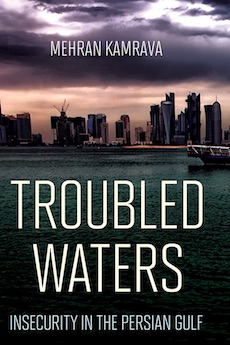By Fred H. Lawson
Politics in the Persian Gulf region continues to shape the prospects for world peace and prosperity, despite the steady decline of Saudi Arabia, the United Arab Emirates (UAE), Kuwait and Qatar as key suppliers of oil and gas to the global hydrocarbons market. Saudi Arabia and Qatar played pivotal roles in the initial stages of the civil war in Syria, which has subsequently entrapped Turkey, Russia, and Israel. Saudi Arabia and the UAE intervened even more directly and forcefully in the contest for control of Yemen, which affects Sudan, Somalia and Ethiopia. In both conflicts, the Arab Gulf states have ended up confronting the Islamic Republic of Iran, either directly in the form of the al-Quds Force—the foreign legion of the Islamic Revolutionary Guards Corps—or indirectly through such close Iranian allies as the Lebanon-based Party of God (Hizbullah) or the militant Yemeni movement the Supporters of God (Ansar Allah, more commonly known as the Huthis).
Troubled Waters offers a succinct and accessible, yet nuanced and conceptually sophisticated, guide to the fundamental dynamics that shape inter-state security relations in the contemporary Gulf. Mehran Kamrava lays out the crucial vulnerabilities that drive the foreign policies of Saudi Arabia, Iran, the UAE, and other states in the region. These include not only military dangers and economic competition, but also the demographic and cultural threats that citizens of the Arab Gulf states experience so acutely at the present moment. In addition, the book shows how local rivalries intersect with the actions and interests of the United States, often in ways that work to the detriment of regional stability. Readers who wish to follow up on points that get addressed in the text will find extensive references to pertinent scholarly writing.
Specialists may wish that the author had expanded the discussion of the ways in which various security dilemmas have prompted Saudi Arabia, Iran, and the UAE to become increasingly assertive in their attempts to protect themselves. Why these governments have reacted to the threats they pose to one another by stepping up their involvement in neighboring countries and boosting military spending, rather than trying to find some areas of mutual accommodation, is a question that would be worth pursuing a bit further. One might also quibble over the assertion that “Riyadh and Tehran have sought to become the Gulf’s dominant local powers,” which seems to run counter to the underlying thesis that leaderships in the Gulf are acting from a position of vulnerability and threat. Furthermore, introducing toward the end the notion that misperceptions play a large part in determining inter-state interactions brings into question several earlier lines of argument.
Nevertheless, no other survey of Gulf affairs gives readers a more cogent and insightful foundation for understanding current trends in this part of the world—a corner of the globe that if Kamrava is correct is likely to remain turbulent, if not actually explosive, for years to come.
Fred H. Lawson (ΦBK, Indiana University, 1973) is Visiting Professor of National Security Affairs at the Naval Postgraduate School.




